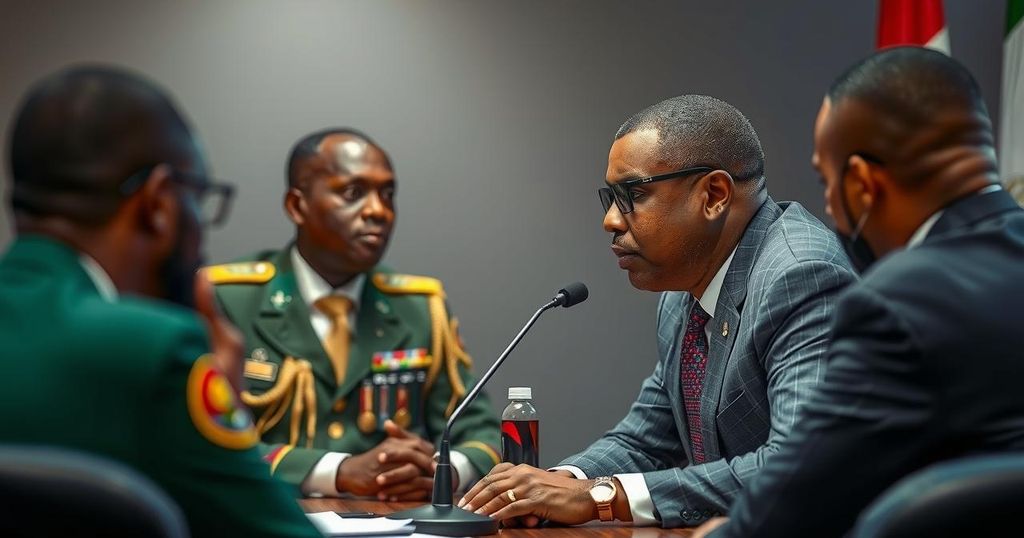Rwanda Reiterates Commitment to Luanda Peace Process Amid Regional Tensions
Ambassador Olivier Nduhungirehe reinforced Rwanda’s commitment to the Luanda peace process and denied claims of troop deployment to support M23 rebels in DRC. He emphasized the need to neutralize the FDLR militia and called for direct talks with M23 to address the root causes of conflict. Rwanda maintains its right to defensive measures against security threats from the DRC, amid concerns over rhetoric and armed groups associated with Congolese support.
Ambassador Olivier Nduhungirehe, the Minister of Foreign Affairs and International Cooperation for Rwanda, firmly reaffirmed the nation’s commitment to the Luanda peace process, which aims to address security tensions with the Democratic Republic of the Congo (DRC). In a recent interview, he denied allegations that Rwanda has dispatched troops to aid the M23 rebel group in eastern DRC. He emphasized Rwanda’s adherence to the agreements established in Luanda, particularly regarding the neutralization of the FDLR militia, noted for its historical ties to the 1994 genocide against the Tutsi in Rwanda. Amb Nduhungirehe asserted, “We are bound by what we say and we signed in Luanda. In Luanda, what is on the table now is a harmonised plan for the neutralisation of the FDLR, and then the lifting of our [security] measures.” He clarified that the current discussions under the Luanda framework do not include stipulations for the withdrawal of Rwandan troops, as wrongly suggested by officials from the DRC, but rather focus on border security enhancements amidst ongoing threats. The Luanda process, supported by the African Union, commenced in mid-2022 to mediate growing diplomatic strains stemming from hostilities between the Congolese forces and M23 rebels. Minister Nduhungirehe elaborated that Rwanda remains prepared to enter into peace agreements that align with its security interests. He reiterated earlier statements emphasizing that the country will defend itself against any legitimate threats emanating from the DRC, particularly in light of FDLR’s activities. The minister asserted, “It’s not only the armed group supported by the DRC government, but also the rhetoric that goes with it. President [Felix] Tshisekedi has said on several occasions that he wants to help Rwandan youth overthrow their government.” These remarks highlight the perceived existential threats posed not just by militant groups but also by hostile political insinuations. Addressing the persistent M23 conflict, he pointed out that it arises from the marginalization of the Congolese Tutsi community. He urged the DRC government to engage in direct negotiations with M23 to tackle the underlying issues contributing to the ongoing violence. Furthermore, he expressed serious concerns regarding the integration of FDLR operatives, a UN-sanctioned group, into the Congolese army and its implications for regional stability.
The ongoing tensions between Rwanda and the Democratic Republic of the Congo (DRC) stem from historical grievances related to the Rwandan genocide in 1994 and subsequent conflicts. The Luanda peace process was initiated to seek a diplomatic resolution to issues arising from hostilities between Rwandan and Congolese forces, specifically regarding the activities of the M23 rebel group and the FDLR militia. This process has garnered support from the African Union and aims to stabilize the region while addressing security concerns bolstered by past conflicts and ongoing arms flows triggering violence in eastern DRC.
In conclusion, Ambassador Nduhungirehe’s remarks reflect Rwanda’s commitment to the Luanda peace process while standing firm against accusations of military involvement in the DRC. He highlights the need for direct communication and resolution regarding the M23 crisis and underscores the security concerns posed by FDLR. Rwanda’s defensive measures are portrayed as necessary to preserve national integrity amid regional tensions. Ultimately, the resolution hinges on addressing the core issues affecting both Rwandan and Congolese communities.
Original Source: www.newtimes.co.rw




Post Comment